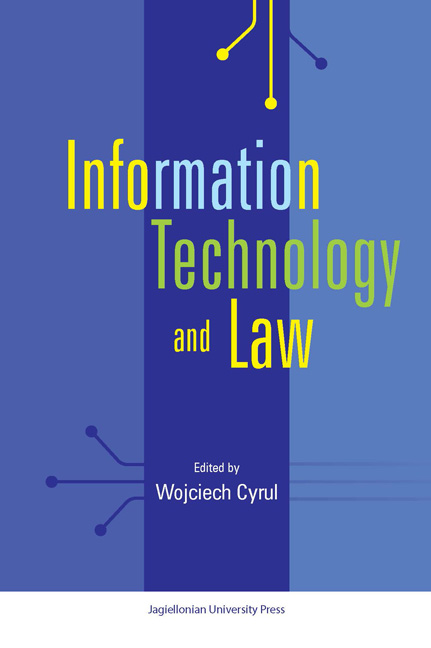Book contents
- Frontmatter
- CONTENTS
- Preface
- Chapter 1 Technological Destabilization of Law
- Chapter 2 Problems with the Storing and Presentation of Information
- Chapter 3 XML Models for Legal Documents: Current Polish Practices and International Standards
- Chapter 4 Similarity Analysis of Polish Legal Documents Using WordNets Semantic Relations
- Chapter 5 Consolidation of Legal Documents in an Electronic Format
- Chapter 6 A Three Dimensional – Code and a Question of the Normative Hyper-linking?
- Chapter 7 The Law, Labour Unions and Information Technology: Enhancing or Restricting Democracy at the Workplace
- Chapter 8 Protection of the Consumer in Digital Content Contracts
- Chapter 9 Procedure, Time and Imputation in Criminal Law
Chapter 9 - Procedure, Time and Imputation in Criminal Law
Published online by Cambridge University Press: 05 December 2014
- Frontmatter
- CONTENTS
- Preface
- Chapter 1 Technological Destabilization of Law
- Chapter 2 Problems with the Storing and Presentation of Information
- Chapter 3 XML Models for Legal Documents: Current Polish Practices and International Standards
- Chapter 4 Similarity Analysis of Polish Legal Documents Using WordNets Semantic Relations
- Chapter 5 Consolidation of Legal Documents in an Electronic Format
- Chapter 6 A Three Dimensional – Code and a Question of the Normative Hyper-linking?
- Chapter 7 The Law, Labour Unions and Information Technology: Enhancing or Restricting Democracy at the Workplace
- Chapter 8 Protection of the Consumer in Digital Content Contracts
- Chapter 9 Procedure, Time and Imputation in Criminal Law
Summary
“Actually I'm quite different. But I so rarely have time to show it”
(Ödön von Horváth)1. Introduction
The body of contemporary criminal law falls into substantial and procedural criminal law. This division is relatively recent and not to be taken absolutely. Even in the German speaking tradition, where it is developed in a rather clear manner, there is a latent interplay between these branches, for the main procedural endeavour of gathering evidence is reflected in substantial law. If substantial law provides too many obstacles to gathering evidence, substantive norms are often eroded by interpretation or amended to ease evidence. In German law, where a substantive offence (“Tatbestand”) is in general designed to secure a specific legal interest (“Rechtsgut”), one finds exceptions of criminal offences that are designed to secure the interest of getting evidence (“Ermittlungstatbestände”), most prominent in the offence of money laundering (“Geldwäsche”, § 261 StGB).
Apart from the far-reaching division between substantive law and procedural law in the German speaking tradition, there are major legal systems where the division is not as strict. In a more procedural perspective, substantive matters are dealt with in a more pragmatic way. Thus, the separation of justification and excuse, a landmark in German criminal law, is less important in this perspective. This may be illustrated by the fact that the French and the Common Law doctrine has been so influential in International and European criminal law.
Legal practitioners almost naturally defend a pragmatic approach.
- Type
- Chapter
- Information
- Information Technology and Law , pp. 141 - 154Publisher: Jagiellonian University PressPrint publication year: 2014



